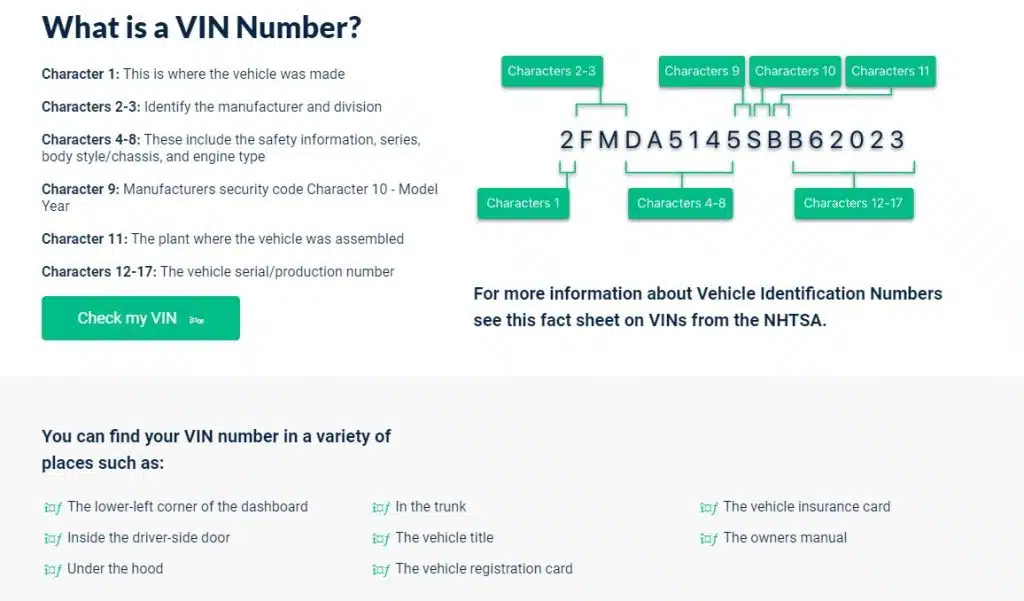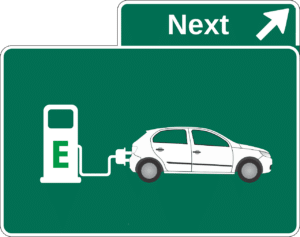Many myths are connected to the type of data you can retrieve from a vehicle VIN. Deciphering the VIN can be a challenge for even the most experienced person. With this in mind, we decided to look at the top 6 Common Misconceptions About VIN Data.
1- VINs Contain The Same Information For All Vehicles
It is a fact that the VIN will contain the engine type, year, make, and model of a vehicle in the coding. However, many additional things can be found in the VIN that will depend on the make and model, manufacturer, and country of origin of the vehicle.
Depending on the manufacturer and vehicle type, you may also find out specific things about a vehicle like special options added to that car, where it was manufactured, and sometimes if it was made in a special color.
2- VINS Contain The License and Registration Information
The VIN does not contain any of the licensing and registration of the vehicle. Licensing and registration is handled in the state where the vehicle was purchased. You cannot even tell the original licensing and registration for the vehicle through the VIN because it would require the number to be changed when the license plate was issued.
If you are looking for a history of the vehicle registrations on a used vehicle, it will be very beneficial to work with a company like VIN Smart that can provide you with a detailed history of the vehicle created from many information sources.
3- VINs Contain The Information For Purchasing Parts
You can get some important information from the VIN concerning part information such as type of engine and weights and capacities of the vehicle. Still, a majority of the relevant information about parts must come from a different source.
The only real exception to the rule is if the VIN contains information about a special item installed into the car. If it was and you need to repair or replace that part, you may get the best match by using the VIN.
4- The VIN Gives A History Of The Vehicle
The VIN can give you the origin information about the vehicle, but it does not provide you with historical data. However, the VIN can be used to retrieve some historical data from other sources.
Insurance companies, repair facilities, and dealerships often report accidents and repairs made to a vehicle to their state agencies. This is all filed by VIN. Using a service like VIN Smart, you can pull an entire vehicle history for any vehicle based on the VIN. VIN Smart will search all of the available databases to produce a vehicle history report that includes all reported repairs and accidents. VINsmart can help you decode your VIN number here.

5- VIN Decoders Provide Enough Information
Some VIN decoders are available for anyone to use as a free resource. In some cases, these decoders can be very helpful. However, these services do not provide a comprehensive search of the information relating to your vehicle number.
In most cases, the decoder can tell you when and where your vehicle was made and the make and model. However, the decoder cannot tell you how often the vehicle has been registered, if there are recalls on the vehicle and if they have been repaired, or any reported car repairs that have been completed. The VIN decoder cannot tell you if the vehicle has ever been in a flood or other natural disaster or if the title has been registered as totaled. The decoder may be able to tell you in some states if the title is now a salvage vehicle, but this is not guaranteed.
Using a service like VIN Smart will help you get all of the information you need on a vehicle in one comprehensive report. We access all of the available databases to ensure that we retrieve as much information as possible about the vehicle.
6- VIN Numbers Are Always Based On Where The Vehicle Was Made
Since 1981, vehicles sold in North America all follow the NHTSA standard for VIN standards. All other areas of the world follow the ISO standard. While this may make it seem easy to decipher, it does not. A vehicle produced in Europe but is made for the North American sales market will have the NHTSA VIN assigned to the vehicle even though it was manufactured in Europe. The same applies for North American cars intended for sales overseas; they will be marked with the ISO VIN, although they were built here.
In the end, discovering all the information about a vehicle through the VIN is possible, but only when you have access to all of the databases that track a vehicle by this number. The VIN alone can only provide you with limited information about the manufacturing of the vehicle. Anything more than that must be researched.
Most importantly, always remember to have a VINsmart report run on the vehicle before making any vehicle purchase. A VINsmart report will run a complete history on the vehicle including if it has ever been reported as stolen, has been involved in any major accidents, or has been listed as a totaled vehicle.
VINsmart reports will also give you a history of every time the vehicle has been registered, a history of the mileage. They can report any significant incidents related to the vehicle, such as being involved in a fire or flood.
If you are going to purchase a used vehicle, the best way to ensure that you are making a good purchase decision is to know the vehicle’s complete history before you buy.





